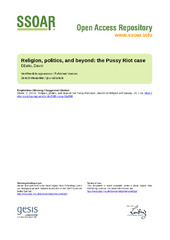Religion, Politics, and Beyond : The Pussy Riot Case
Чланак у часопису (Објављена верзија)
Метаподаци
Приказ свих података о документуАпстракт
The recent case of the Russian punk group Pussy Riot, their performance in Moscow
Cathedral and the subsequent legal actions against them, have highlighted many important
issues that Russian society faces today. However, this case can also be the basis for a more
general analysis of the relations of religion and politics and the political dimension of
Orthodox Christianity.
Examining the relationship between religion and politics can point to two important
elements that both religion and politics, in their institutional manifestations, share: 1) the
“will to power,” and 2) the communitarian dimension of human existence. In order to fully
understand the paradoxical position of Christianity in respect to politics and state, it is
necessary to differentiate between “eschatological” and “historical” Christianity.
Извор:
Journal of Religion and Society, 2013, 1-14Колекције
Институција/група
IFDTTY - JOUR AU - Džalto, Davor PY - 2013 UR - http://rifdt.instifdt.bg.ac.rs/123456789/1152 AB - The recent case of the Russian punk group Pussy Riot, their performance in Moscow Cathedral and the subsequent legal actions against them, have highlighted many important issues that Russian society faces today. However, this case can also be the basis for a more general analysis of the relations of religion and politics and the political dimension of Orthodox Christianity. Examining the relationship between religion and politics can point to two important elements that both religion and politics, in their institutional manifestations, share: 1) the “will to power,” and 2) the communitarian dimension of human existence. In order to fully understand the paradoxical position of Christianity in respect to politics and state, it is necessary to differentiate between “eschatological” and “historical” Christianity. T2 - Journal of Religion and Society T1 - Religion, Politics, and Beyond : The Pussy Riot Case SP - 1 EP - 14 UR - https://hdl.handle.net/21.15107/rcub_rifdt_1152 ER -
@article{
author = "Džalto, Davor",
year = "2013",
abstract = "The recent case of the Russian punk group Pussy Riot, their performance in Moscow
Cathedral and the subsequent legal actions against them, have highlighted many important
issues that Russian society faces today. However, this case can also be the basis for a more
general analysis of the relations of religion and politics and the political dimension of
Orthodox Christianity.
Examining the relationship between religion and politics can point to two important
elements that both religion and politics, in their institutional manifestations, share: 1) the
“will to power,” and 2) the communitarian dimension of human existence. In order to fully
understand the paradoxical position of Christianity in respect to politics and state, it is
necessary to differentiate between “eschatological” and “historical” Christianity.",
journal = "Journal of Religion and Society",
title = "Religion, Politics, and Beyond : The Pussy Riot Case",
pages = "1-14",
url = "https://hdl.handle.net/21.15107/rcub_rifdt_1152"
}
Džalto, D.. (2013). Religion, Politics, and Beyond : The Pussy Riot Case. in Journal of Religion and Society, 1-14. https://hdl.handle.net/21.15107/rcub_rifdt_1152
Džalto D. Religion, Politics, and Beyond : The Pussy Riot Case. in Journal of Religion and Society. 2013;:1-14. https://hdl.handle.net/21.15107/rcub_rifdt_1152 .
Džalto, Davor, "Religion, Politics, and Beyond : The Pussy Riot Case" in Journal of Religion and Society (2013):1-14, https://hdl.handle.net/21.15107/rcub_rifdt_1152 .


